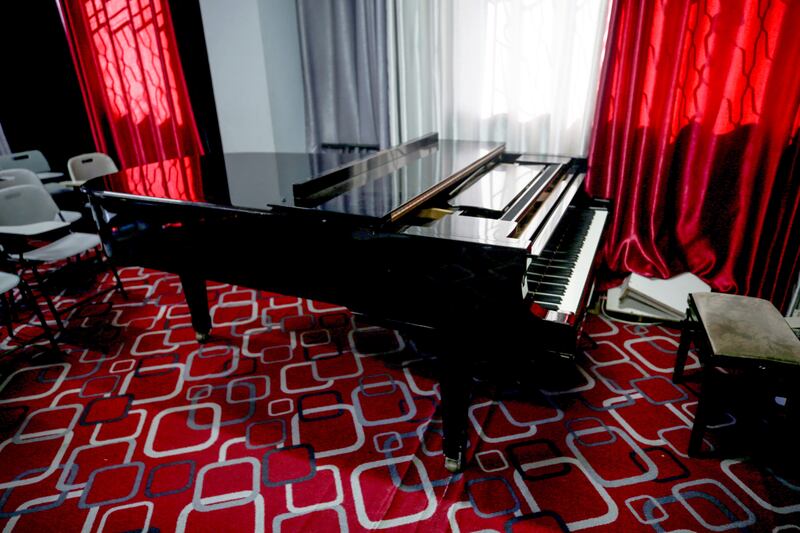His hands gliding over the white keys, Anas Alnajar sits in an empty room and plays an instrument with a remarkable history: Gaza’s only grand piano.
“I’m so lucky to have the chance to play it. Playing the piano makes me feel comfortable and relaxed,” Alnajar tells The National at the Edward Said National Conservatory of Music in Gaza.
Wearing a white T-shirt and disposable face mask, the teacher, 38, sits on a piano stool before rows of plastic chairs. Sunshine seeps into the room through cracks between heavy red and grey curtains.
“We are so proud to have the piano in the institute,” says Alnajar of the black Yamaha instrument that has scratches on its body.
The grand piano arrived in Gaza in 1998, as a donation from Japan, before the Second Intifada of the early 2000s and subsequent four conflicts with Israel.
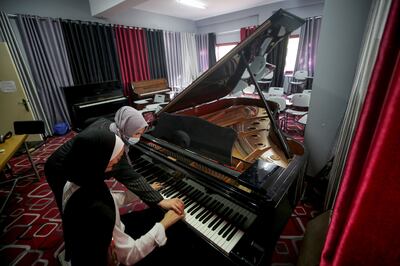
In recent years it has faced a precarious future, after being rendered unplayable by a missile strike during the 2014 conflict.
MusicFund, a charity in Brussels, stepped in to restore the piano before it was transported in 2018 to the conservatory.
Opening the instrument reveals rows of strings, on top of a soundboard bearing an intricate logo, appearing in excellent condition.
Manal Awwad, head of the conservatory’s Gaza branch, says the piano is kept permanently in one small room where performances are held.
“The instrument is very delicate so we don’t move it from its location,” she explains. “For us to have the grand piano at the institute is like having treasure; it has a special sound.”
But the instrument may never have made it to the conservatory, housed in a building shared with paramedics whose ambulances are lined up outside.
The grand piano had initially been played at a theatre within Al Nawras Resort in northern Gaza, which closed in 2007. It gathered dust until the strike seven years later brought its fate to the fore.
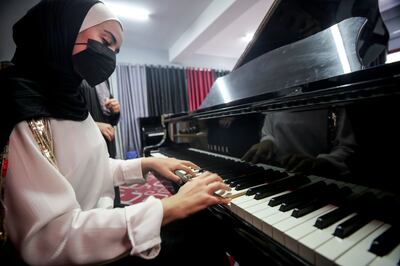
Ownership was claimed by Saed Herzallah, a businessman who had bought the resort and its contents in 2011. Gaza’s Ministry of Culture disputed this as the instrument was originally donated by Japan, sparking negotiations that eventually led to Herzallah giving the piano to the officials.
Atef Asquol, general director of arts and heritage at the ministry, blamed “neglect, greed and bureaucratic reasons” for the time lost while the piano sat in storage.
“I feel that I am lucky to be part of moving the piano from the basement,” he says. “And now it is located in the right place.”
A committee was set up to decide the piano's fate. It chose the conservatory out of seven possible music organisations to host the instrument, Asquol explains, under a contract renewed annually.
“This precious, highly valued piece is supposed to be invested in the right way,” he says.
The instrument came under further threat during the 11-day conflict in May, when Israel launched air strikes on Gaza while Palestinian militants fired rockets at Israeli territory.
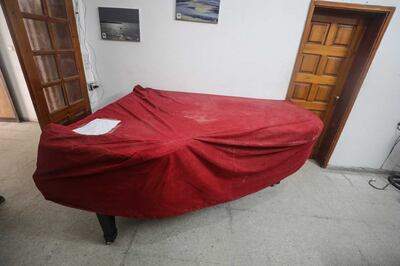
Awwad says she was worried about the conservatory's instruments during the deadly conflict, but Gaza lacks bomb shelters for civilians, let alone objects.
“If we can’t save ourselves, how can we save the instruments? The first thing we do after the end of any round of fighting is come and check on the instruments.”
The conservatory was unscathed in the latest conflict, allowing students to get back to their lessons after the ceasefire.
With a Yamaha grand piano costing upwards of $11,000, replacing such an instrument would probably be impossible for the music school.
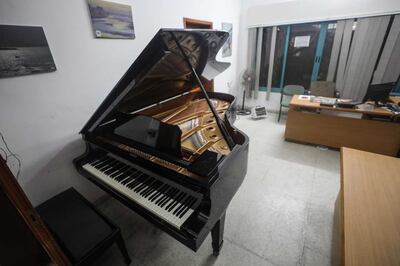
The average income in Gaza was less than $22 per day last year, for the thousands of daily wagers who are only paid for the time they work, according to the Palestinian Central Bureau of Statistics.
Some music students have upright pianos or electronic keyboards at home, which are more affordable, but they can’t compare to playing on a grand.
“I like to come here to play on the grand piano,” says pupil Zaina Al Agha, 15. “This piano gives me a different feeling.”
